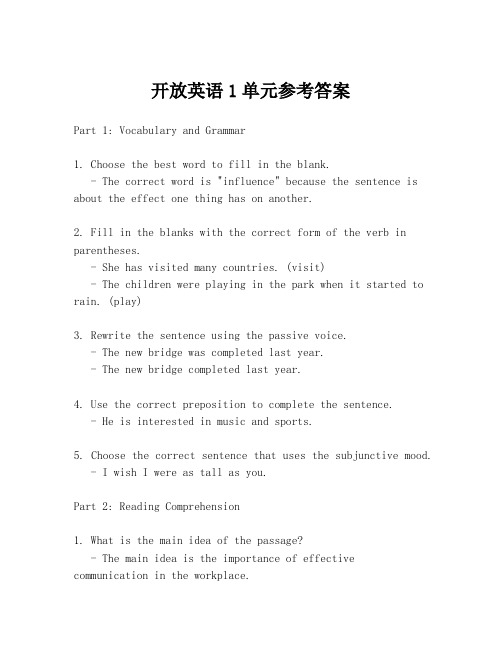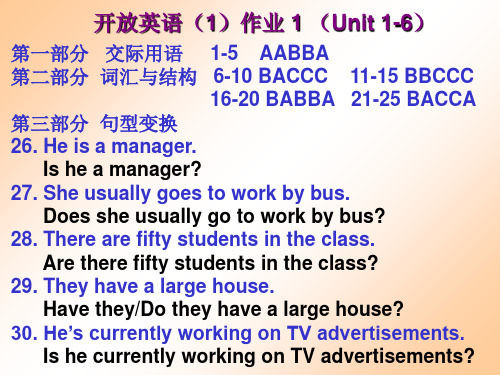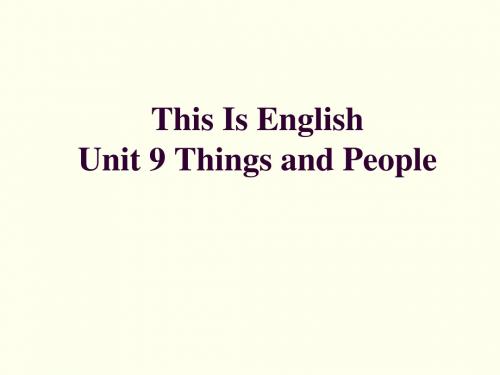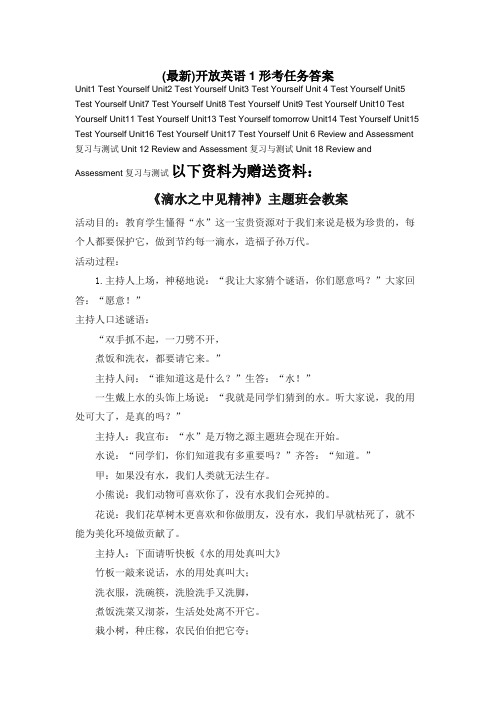开放英语1 Unit9-10 11.15(第六次课)
开放英语1单元参考答案

开放英语1单元参考答案Part 1: Vocabulary and Grammar1. Choose the best word to fill in the blank.- The correct word is "influence" because the sentence is about the effect one thing has on another.2. Fill in the blanks with the correct form of the verb in parentheses.- She has visited many countries. (visit)- The children were playing in the park when it started to rain. (play)3. Rewrite the sentence using the passive voice.- The new bridge was completed last year.- The new bridge completed last year.4. Use the correct preposition to complete the sentence.- He is interested in music and sports.5. Choose the correct sentence that uses the subjunctive mood. - I wish I were as tall as you.Part 2: Reading Comprehension1. What is the main idea of the passage?- The main idea is the importance of effective communication in the workplace.2. According to the passage, why is it important to listen actively?- It is important to listen actively because it helps to understand the speaker's message clearly and respond appropriately.3. What is the author's opinion on the use of jargon in professional settings?- The author believes that jargon should be used sparingly and only when necessary, as it can create barriers in communication.4. How can non-verbal communication affect the way a message is perceived?- Non-verbal communication, such as body language and facial expressions, can either reinforce or contradict the verbal message, affecting how it is perceived by others.5. What is the best title for the passage?- "Enhancing Communication Skills in the Workplace"Part 3: Listening Comprehension1. What is the speaker's main concern about the new project? - The speaker is concerned about the tight deadline for the project.2. Why does the manager suggest postponing the meeting?- The manager suggests postponing the meeting because the key team member is unavailable.3. What is the woman's opinion on the company's dress code policy?- The woman believes that the dress code policy is too strict and should be more flexible.4. What does the man suggest as a solution to the problem discussed?- The man suggests conducting a survey to gather feedback from employees before making a decision.5. What is the purpose of the conversation?- The purpose of the conversation is to discuss and resolve issues related to the company's operations.Part 4: Writing1. Write a short essay on the importance of environmental protection.- Environmental protection is essential for maintaining the balance of ecosystems and ensuring a healthy planet for future generations. It involves conserving natural resources, reducing pollution, and promoting sustainable practices.2. Describe a memorable event in your life.- One memorable event was my graduation ceremony. It was a day filled with pride and joy, as it marked the culmination of years of hard work and the beginning of a new chapter in life.3. Write a letter to a friend, inviting them to a birthdayparty.- Dear [Friend's Name], I hope this letter finds you well.I am writing to invite you to my birthday party next Saturday. It would be wonderful to celebrate this special day with you. Please let me know if you can attend.4. Discuss the impact of technology on education.- Technology has revolutionized education by providing access to vast amounts of information, enhancing learning experiences through interactive tools, and enabling distance learning. However, it also presents challenges such asdigital divide and the need for effective integration intothe curriculum.5. Write a dialogue between two friends discussing theirplans for the weekend.-A: Hey, what are your plans for the weekend?B: I was thinking of going to the new art exhibition. How about you?A: That sounds interesting. I might join you. I also needto catch up on some reading for my history class.B: Great, let's make a day of it. We can grab lunch afterwards.Part 5: Speaking1. Role-play a conversation between a customer and a shop assistant about a product.- Customer: Excuse me, could you tell me more about this camera?Assistant: Of course! This model is our best-seller with excellent image quality and a user-friendly interface.2. Discuss the benefits of learning a second language.- Learning a second language opens up opportunities for travel, work, and cultural understanding. It also enhances cognitive abilities and promotes personal growth.3. Practice a presentation on the topic of "Healthy Lifestyle."- A healthy lifestyle includes a balanced diet, regular exercise, adequate sleep, and stress management. It contributes to overall well-being and reduces the risk of chronic diseases.4. Act out a scenario where you are explaining the directions to a tourist。
开放英语1形成性考核册答案课件

44. I have a reservation for a single room. 我预定了一间单人间。
45. I’m waiting for an important telephone call from my boss in Shanghai. 我正在等我的上海老板的一个重要 。
2. 这几个单元介绍了多种用于表示将来的时态和句子结 构,请各举一个例。 (1) 一般现在时表示预先安排的日程(Unit 13)
Next month I do sports on Saturday. (2) 现在进行时表示将来的安排(Unit 14)
Is she coming back to London on Thursday? (3) 一般将来时表示预测(Unit 15)
It doesn’t usually snow in winter in Ireland. 28. Put them on the desk.
Don’t put them on the desk. 29. She has got brown wavy hair.
She hasn’t got brown wavy hair. 30. I need to buy some apples.
开放英语(1)作业 1 (Uபைடு நூலகம்it 1-6)
第一部分 交际用语 1-5 AABBA 第二部分 词汇与结构 6-10 BACCC 11-15 BBCCC
16-20 BABBA 21-25 BACCA 第三部分 句型变换 26. He is a manager.
电大——开放英语1形考册作业答案

开放英语(1)形考册参考答案作业1第一部分交际用语(每题2分,共10分)1. B2. B3. B4. A5. C第二部分词汇与结构(每题2分,共40分)6. B7. A8. C9. C 10. C11. B 12. B 13. C 14. C 15. C16. B 17. A 18. B 19. B 20. A21. B 22. A 23. B 24. A 25. B第三部分阅读理解(每题2分,共20分)26. B 27. C 28. B 29. A 30. A31. C 32. A 33. B 34. A35. C第四部分翻译(每题3分,共30分)以下答案供参考36. a quarter past seven (o’clock ) / seven fifteen37. from 8 (o’clock ) in the morning to 3 (o’clock ) in the afternoon / from 8 pm to 3 am38. works in insurance39. that’s a good idea40. Why don’t you41. 明天下午去踢足球怎么样?42. 我想找一套一楼的公寓。
43. 你喜欢看英文报纸吗?44.他不是程序员, 他是工程师。
45.她正在和客户谈话。
作业2第一部分交际用语(每题2分,共10分)1. C2. B3. B4. C5. C第二部分词汇与结构(每题2分,共40分)6. B7. C8. B9. A10. C11. C 12. A 13. A 14. A15. A16. B 17. A 18. B 19. A 20. A21. A22. C 23. A 24. B 25. C第三部分阅读理解(每题2分,共20分)26. B 27. A28. C 29. A 30. C31. C 32. A 33. A 34. B 35. B第四部分翻译(每题3分,共30分)以下答案供参考36. What’s the weather like today37. not comfortable enough38. opposite the supermarket39. Would you like to leave a message40. is bad at / isn’t good at41.她不喜欢向别人借东西。
开放英语1 讲义共110页文档

开放英语1 讲义
11、获得的成功越大,就越令人高兴 。野心 是使人 勤奋的 原因, 节制使 人枯萎 。 12、不问收获,只问耕耘。如同种树 ,先有 根茎, 再有枝 叶,尔 后花实 ,好好 劳动, 不要想 太多, 那样只 会使人 胆孝懒 惰,因 为不实 践,甚 至不接 触社会 ,难道 你是野 人。(名 言网) 13、不怕,不悔(虽然只有四个字,但 常看常 新。 14、我在心里默默地为每一个人祝福 。我爱 自己, 我用清 洁与节 制来珍 惜我的 身体, 我用智 慧和知 识充实 我的头 脑。 15、这世上的一切都借希望而完成。 农夫不 会播下 一粒玉 米,如 果他不 曾希望 它长成 种籽; 单身汉 不会娶 妻,如 果他不 曾希望 有小孩 ;商人 或手艺 人不会 工作, 如果他 不曾希 望因此 而有收 益。-- 马钉路 德。
Unit9开放英语I

指路 The bus stop is outside the greengrocer's.
The supermarket is over there, opposite the café.
Yes, the bank is on the corner, near the station. Yes, there is. There is a bank on the corner, near the station. I’m sorry, I don’t know.
所学介词总汇(1)
Unit 1
Work with a person. Work for a company. Work at a place. Work in a town.
所学介词总汇(2)
Unit 2 (1)at, for, in at 用于具体时间和地点,如:
I work at BTVU. / He comes at 7:00. for 表示“为了”和“作为”,如: He works for IBM. She likes milk for breakfast. in 用于年,月,季节,…期间,如: in 1999, in May, in spring, in the morning/afternoon/evening
Unit 4 在某领域工作用in表示:
如 work in medicine Unit 7课文中介词: by plane/train/coach in the center from…to… Thank you for …
所学介词总汇(5)
Unit 8 表示方位介词
on 在…上面 above 在…之上 under在…下面 in front of 在…前面 behind在后面 in 在…里面 next to与…相邻
开放英语1

3.45 It is a quarter to four/three forty-five.表示 时间的介词
at for
from---to
Unit3
提议与应答 基数词和序数词 There be 句型
提W议oul与d yo应u li答ke s(th.?1)
Would you like to do sth.?
人的情况 • 表达自己及他人的喜好 • 讨论休闲活动 • 讨论旅行安排 动词 To be的用法 代词
介绍自己
I’m …
I am....
My name …
My name is Weifang.
I’m from…
I am from Changxing.
I’m...
I’m an accountant/manager.
Yes, I do . No, I don't.
Do they work hard?
Does he go to work?
Yes, he does. No, he doesn't.
Does Li Ping enjoy working?
频度副词
never sometimes often usually always 注意频度副词在句子中有不同的位置 1。在动词to be之后 I am usually at home on Sunday. He was always late for school. 2。在实意动词之前 He usually goes to work at seven o'clock. We sometimes have English classes on Sunday. 在含有助动词的句子中 ,助动词+频度副词+实意动词 He doesn't usually go to work at seven o'clock. We don't sometimes have English classes on Sunday.
开放英语 1 unit 9

Activity 2
1. supermarket ---- milk 2. bank ---- dollars 3. post office ---- stamps 4. chemist(’s) ---- aspirin 5. greengrocer(’s) ---- apples 6. newsagent(’s) ---- newspaper 7. café---- a cup of coffee
Language Focus
表示方位的介词或介词词组 在指路时经常会用到下列表示方位的介词或介词 词组。 next to 表示“紧靠……旁边”: The supermarket is next to the chemist's. near 表示“靠近,在附近”: The bank is near the station. between 表示“在……中间”: The bank is between the post office and the café .
短语动词 短语动词是固定词组,由动词加介词或副词组成, 其作用相当于一个动词。短语动词需整体记忆, 因为其意义并非该动词组成部分的意义之和。例 如: They get up at 10 o'clock. (起床) They get on the bus at the station.(上车) They get on well together. (相处) They get off the bus at the swimming pool. (下车) I must get off to work.(动身,离开) Sam gets about a lot. He's in London today and last week he was in Edinburgh. (走动,旅行) This rainy weather gets me down. (使……情绪低 落)
(最新)开放英语1形考任务答案

(最新)开放英语1形考任务答案Unit1 Test Yourself Unit2 Test Yourself Unit3 Test Yourself Unit 4 Test Yourself Unit5 Test Yourself Unit7 Test Yourself Unit8 Test Yourself Unit9 Test Yourself Unit10 Test Yourself Unit11 Test Yourself Unit13 Test Yourself tomorrow Unit14 Test Yourself Unit15 Test Yourself Unit16 Test Yourself Unit17 Test Yourself Unit 6 Review and Assessment 复习与测试 Unit 12 Review and Assessment 复习与测试 Unit 18 Review andAssessment 复习与测试以下资料为赠送资料:《滴水之中见精神》主题班会教案活动目的:教育学生懂得“水”这一宝贵资源对于我们来说是极为珍贵的,每个人都要保护它,做到节约每一滴水,造福子孙万代。
活动过程:1.主持人上场,神秘地说:“我让大家猜个谜语,你们愿意吗?”大家回答:“愿意!”主持人口述谜语:“双手抓不起,一刀劈不开,煮饭和洗衣,都要请它来。
”主持人问:“谁知道这是什么?”生答:“水!”一生戴上水的头饰上场说:“我就是同学们猜到的水。
听大家说,我的用处可大了,是真的吗?”主持人:我宣布:“水”是万物之源主题班会现在开始。
水说:“同学们,你们知道我有多重要吗?”齐答:“知道。
”甲:如果没有水,我们人类就无法生存。
小熊说:我们动物可喜欢你了,没有水我们会死掉的。
花说:我们花草树木更喜欢和你做朋友,没有水,我们早就枯死了,就不能为美化环境做贡献了。
主持人:下面请听快板《水的用处真叫大》竹板一敲来说话,水的用处真叫大;洗衣服,洗碗筷,洗脸洗手又洗脚,煮饭洗菜又沏茶,生活处处离不开它。
- 1、下载文档前请自行甄别文档内容的完整性,平台不提供额外的编辑、内容补充、找答案等附加服务。
- 2、"仅部分预览"的文档,不可在线预览部分如存在完整性等问题,可反馈申请退款(可完整预览的文档不适用该条件!)。
- 3、如文档侵犯您的权益,请联系客服反馈,我们会尽快为您处理(人工客服工作时间:9:00-18:30)。
肯定式:主语+ can +v+…
否定式:主语+can't ( can not) + v+…
疑问式: Can +主语+v+…?
e.g. You cannot/ can’t go out to play now. 你不允许现在出去玩. 练习题:P87 Activity 2、3 ;P88 Activity 5、6
广州市广播电视大学蓝星分校
ቤተ መጻሕፍቲ ባይዱ
3. 留口信: e.g. Any message for him? 有口信给他吗? Can I take a message? 要留个口信吗? May I take a message? 留个口信好吗? Would you like to leave a message? 您想留个口信吗? Do you want to leave a message? 您想留个口信吗? I’ll call him back. 我会再打电话给他的。
广州市广播电视大学蓝星分校
表示允许与不允许(P86)
情态动词 can用来表示“允许”与may同义,它与别的情态动词 一样,不能单独作谓语,必须与一个动词一起来作谓语。不随 人称变化。构成疑问时,只需将can 提到句首。它的否定可以 是can’t 也可以是cannot 。 e.g. You can smoke in the garden. You can't smoke in the kitchen. Can I use the cooker in the kitchen?
/iə/ /eə/ /ʊə/
集中 双元音
广州市广播电视大学蓝星分校
辅音(28个)
轻辅音 /p/ 浊辅音 /b/ 轻辅音 /ts/ 浊辅音 /dz/ 鼻音 /m/ / t/ /d/ /ʃ/ /ʒ/ /n/ /j/ / k/ /g/ /tʃ/ /dʒ/ /ŋ/ 边音 /ǀ/ /f/ /v/ /tr/ /dr/ /s/ /z/ / h/ /r/ /θ/ /ð /
广州市广播电视大学蓝星分校
表 达 批 评(P78)
1. 表达批评性评论常用的句式too+形容词 “太---”
e.g. The room is too dark. The floor is too dirty.
这边房间太暗。地也太脏。
2. not+形容词 + enough “不够---”
e.g. The room is not big enough. 房间不够大。 The house is not beautiful enough. 房子不够漂亮。
课程安排
广州市广播电视大学蓝星分校
第一周:课程导学&Unit1 第二周:Unit 2-3 第三周:Unit 4-5 第四周: Unit7-8 第五周: 期中测评与总结 第六周: Unit9-10★ 第七周: Unit11&Unit13
第八周: Unit14-15
第九周: Unit16-17 第十周:期末复习与考试指导
广州市广播电视大学蓝星分校 广州市广播电视大学蓝星分校
开放英语 1
主讲人:徐雅雯 邮箱:xuyawen_xenia@ 日期:2015.11.9
成绩考核办法
期末笔试成绩×80%+平时成绩×20% =最终成绩 其中,平时成绩: 到勤率占30分 课堂参与占40分 平时作业占30分
广州市广播电视大学蓝星分校
广州市广播电视大学蓝星分校
询问意见(P73)
would you like to+动词原形 how about/what about/why do not you...../why not ?
练习题:P74 Activity 4
广州市广播电视大学蓝星分校
询问所需时间(P75)
1. 询问花费时间或金钱的句型: It takes + 时间 + to do sth. e.g. It takes twenty minutes for us to get here. 到这儿花20分钟。 Sth. takes +(某人)+时间 e.g. The flight takes three hours. (人)+ spend +时间/金钱+ (on+名词)/(in + v-ing): e.g. He spends a lot of money on books. She spent three hours (in) watching TV. 事/物 + cost + (人) + 时间/金钱: e.g. This dress cost me thirty yuan. Making a dictionary costs plenty of tme. 2. 也可构成特殊疑问句: How long does it take to get your home by train? How long does the journey take? 旅途要花多长时间? 3. 否定句的构成与其他句子相同: It doesn’t take much time to get there. 到那里花不了多少时间。
广州市广播电视大学蓝星分校
2、New words &phrases Learning
Page 112&125 单词表(Vocabulary List)
广州市广播电视大学蓝星分校
3、Grammar Learning
询问意见(P73) 询问所需时间(P75) 表达批评 (P78) 打 电 话 (P80) ☆ 预约时间 (P82) 表示允许不允许(P86) 动词一般现在时和现在进行时 (P89-90) ☆ 描述天气 (P91) 祈使句 (P96) ☆
广州市广播电视大学蓝星分校
4)接听电话者正是要找的人: e.g. Is that John Smith? / Is that you, John? 约翰,是你吗? May I know/ ask who’s calling? 请问您是谁? 5)接听找人电话时: e.g. A moment, please. 请等一下。 Hold on, please. 请等一下。 Hold on a second, please. 请等一下。 Hold the line. I’ll see if he’s in. 请等一下,我去看看他在不。 Hold the line, please. I’ll fetch him up. 请等一下。我去把他找来。 Sorry, but he’s out. 对不起,他出去了。 Sorry, but he’s not here at the moment. 对不起,他现在不在这儿。 Sorry, wrong number. 对不起,打错了。
练习题:P79 Activity 14
广州市广播电视大学蓝星分校
打电话(P80)
1. 接听电话 1)在家里接听电话时,拿起话筒: e.g. Hello. This is John here. Who’s speaking? 喂!我是约翰。你是哪位? 2)在单位接听电话时,拿起话筒: e.g. Computer Company. 有时加上:This is John speaking. 2. 打电话 1)在打公务电话时,打电话的人会自我介绍: e.g. Good morning, this is John Smith. I’m calling about meeting with … 您好,我是约翰? 史密斯,我打电话是关于会见….. 2)比较熟悉时,也可简单一些: e.g. Hello, John here. 喂,我是约翰。 3)询问打电话者/接听电话者是谁,通常可以说: e.g. Who’s calling, please? 请问您是哪位?
一般现在时:表示经常发生的动作或现在存在的状态。
现在进行时:表示说话此刻正在发生的事情或现阶段从事的事情。 Take an umbrella with you. It is raining outside.
二者区别在于:
一般现在时表示的动作是经常的,每天的,总在发生的; 进行时所表示的动作是一段时间,一个阶段的动作。 e.g. 一般现在时:I get up early every day. 我每天早起。 现在进行时:She is cooking breakfast in the kitchen. 她正在厨房里做早饭。
半元音 /w/
广州市广播电视大学蓝星分校
课程学习内容
Topic Discussion 话题讨论 New words &Phrases 新词汇及词组学习
Grammar Learning 语法学习
Homework 家庭作业
广州市广播电视大学蓝星分校
1、Topic Discussion
聊一聊你最喜欢的一个人,并说明缘由。
广州市广播电视大学蓝星分校
3)表示同意约定的时间和地点。 e.g. Yes, 8 on Sunday morning is fine. 星期天上午8点可以。 Let’s make it Saturday morning. 我们约定星期六上午。 Yes, that’s OK. 好的,就这样吧。 That’s fine with me. 那对我很适合。 Let’s meet in the restaurant. 咱们在餐厅见。 See you at the bus stop. 在汽车站见。 4)表示不同意约定的时间、地点。 e.g. I’m sorry, I have another appointment this Saturday. 对不起,本周六我有别的约会。 No, I’m afraid I’m not free. 对不起,我没有空。 Can we make it a little later? 我们可以晚些时候约吗? Could you make it some other time. 您可以约别的时间见面吗? 5)确定下来。 e.g. OK, see you then. 好吧,到时见。 Okey, see you at 8 on Friday. 好吧,星期五八点见。 See you on Friday. 星期五见。
